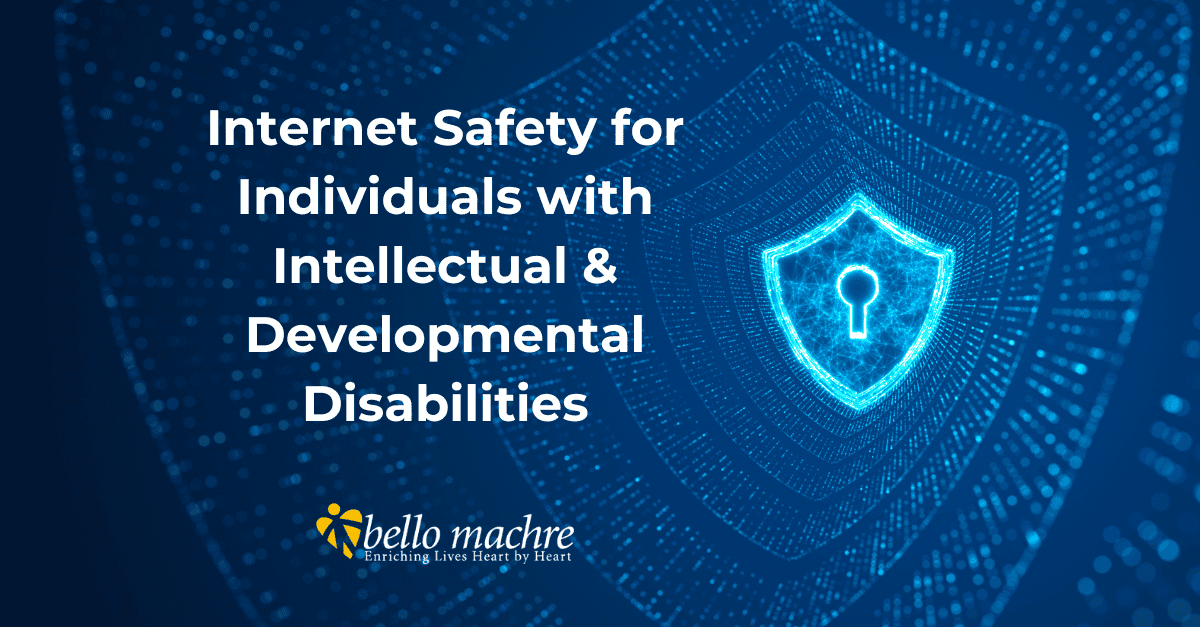Internet Safety for Individuals with Intellectual and Developmental Disabilities
Learn how adults with intellectual and developmental disabilities can stay safe online. Get tips to avoid scams, protect personal info, and enjoy secure online activities.

The Internet provides great opportunities but also risks for all of us, but especially for those of us with intellectual and developmental disabilities.
To help us stay safe online, we’ve enlisted insights from Menkara Williams, a Bello Machre board member and an experienced cybersecurity professional dedicated to protecting individuals and organizations from online threats. Menkara shares valuable knowledge on how to identify and prevent scams, ensuring a safer digital experience for everyone in the community.
Online Safety Tips for Individuals with Special Needs
To safeguard your information, follow these best practices:
Keep devices updated:
Regularly update your devices with the latest security patches to reduce vulnerabilities.
Verify requests:
Always double-check any requests for money or personal details and verify sources before clicking on links.
Strengthen account security:
Use strong, unique passwords and enable two-factor authentication.
Be cautious with QR codes:
Only scan QR codes from trusted sources.
Online Scams and Cyber Threats: What You Need to Know
Scammers are finding different ways to deceive people, from fake job offers that ask for personal details or upfront fees to QR code scams that redirect unsuspecting users to malicious websites. The rise of AI-powered phishing has made fraudulent emails more convincing than ever, while tech support scams continue to trick individuals into granting remote access to their devices.
New and Emerging Online Scams to Watch For
Scammers now use AI-generated phishing messages, impersonation texts that appear to come from trusted sources, and online marketplace scams to trick people into sharing personal or financial information.
How Internet Safety Affects Individuals with Special Needs
Cyber threats can lead to financial losses, identity theft, and security breaches. Reports indicate that scams increased by 25% last year, with over $8 billion in reported losses. Staying informed is the first step toward prevention. Cyber scams don’t just target individuals—they can also compromise the security of organizations like Bello Machre. To protect our clients and staff, Bello Machre adheres to online safety standards, conducts continuous surveillance to monitor for potential threats, and relies on a quick-acting IT team to address any security concerns promptly.
Recognizing Online Scams and Unsafe Websites
Many scams share common warning signs. Be cautious of messages that create a false sense of urgency, ask for sensitive or personal information via email or text, or contain unexpected links and attachments. If you receive a call or message from an unfamiliar source, do not engage directly. Instead, take a moment to verify its authenticity by contacting the company or organization through trusted methods, such as their official website or customer service number. Always be the one to initiate communication to ensure you’re speaking with the real source.
What to Do if You Encounter an Online Threat
If something seems suspicious, trust your instincts. Avoid responding to the message, clicking any links, or providing personal information. If at work, report the suspected scam to your supervisor. You can also report scams to the Federal Trade Commission (FTC) at www.reportfraud.ftc.gov. If you suspect your accounts have been compromised, update your passwords immediately and use antivirus software to check for malware.
Responding Quickly if You’ve been Targeted by a Scam
If you believe you’ve fallen victim to a scam, it’s important to act quickly to minimize potential damage. Start by notifying your bank or credit card company immediately if any financial information was shared. You should also place fraud alerts with the major credit bureaus to protect your credit. Changing passwords or security information related to any compromised accounts is essential. Filing a police report may help prevent further fraud, and be sure to notify any other organizations or service providers that might be impacted by the breach.
Creating a Safe Online Community for Everyone
By staying informed and alert, we can work together to create a safer Internet for individuals with intellectual and developmental disabilities and their families. If something doesn’t feel right, take a step back, verify, and report it. Your vigilance helps create a secure environment for everyone.
